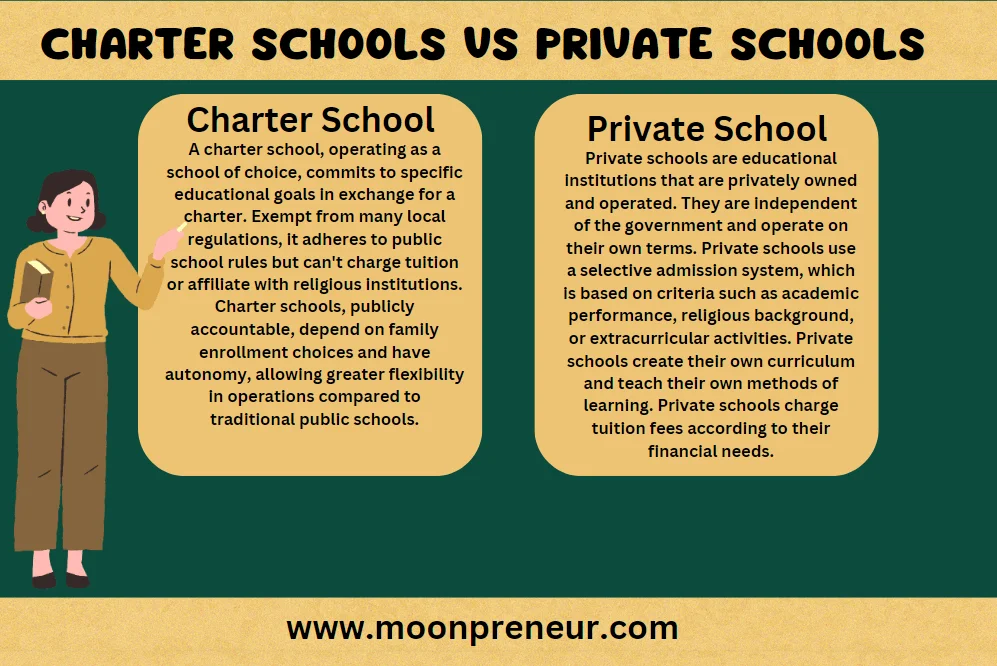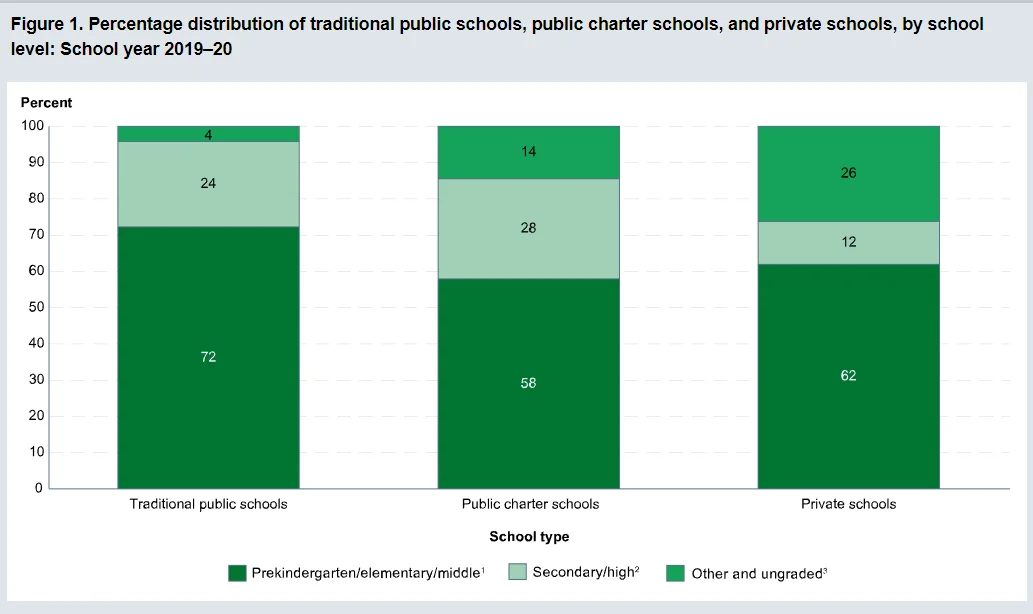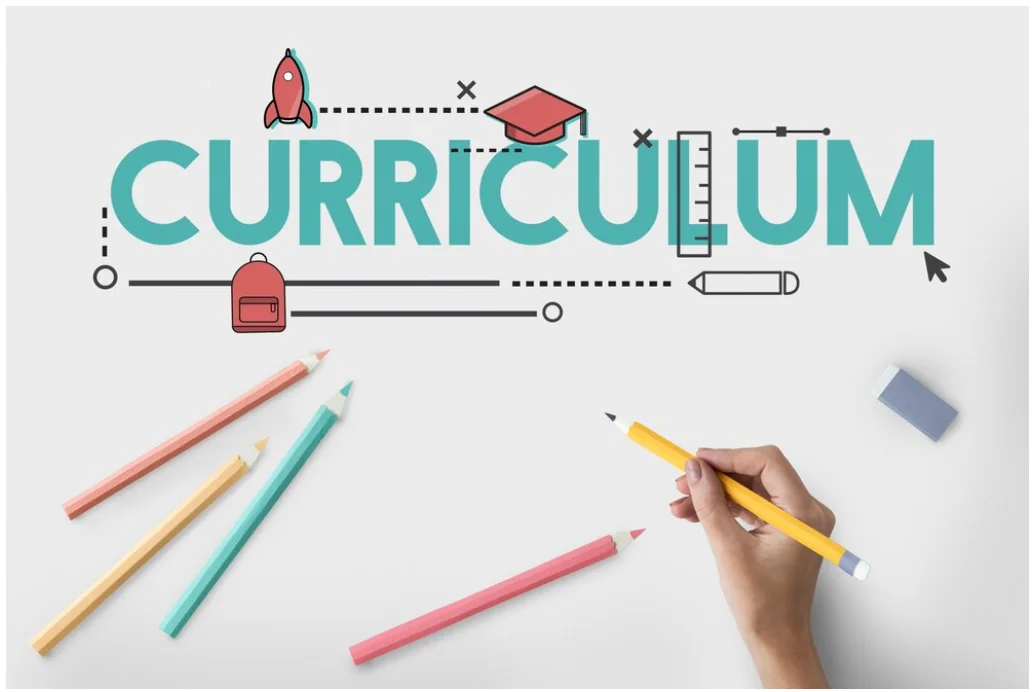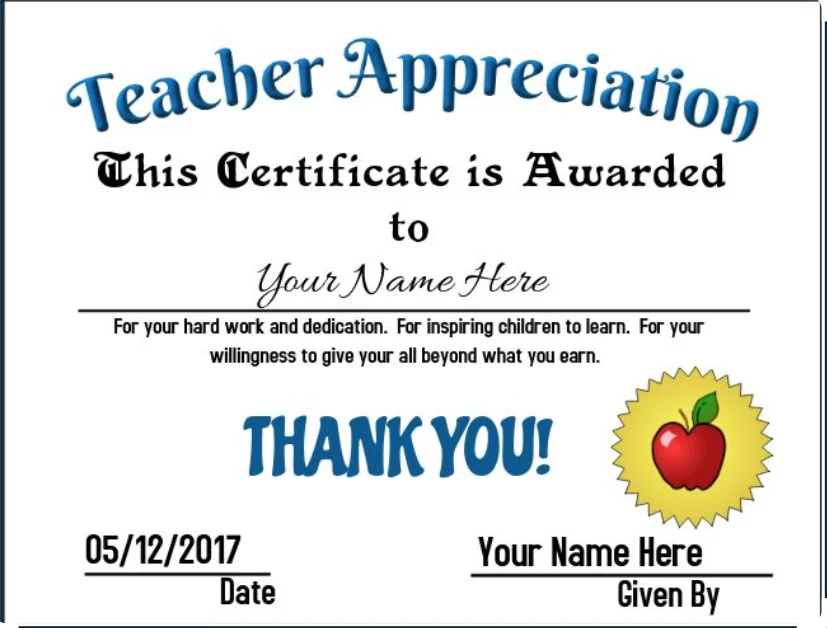Update: This article was last updated on 18th February 2025 to reflect the accuracy and up-to-date information on the page.
Choosing the best school for your child is a challenging task, especially when working with a limited budget or if the local public schools do not live up to their reputation.
Public schools can be free and offer students a broad variety of curricula to choose from, but they are not always satisfactory for every child, as they cannot always be made to fit the individual needs and interests of each student. Education in a private school is more customizable but usually carries an exorbitant fee that is too expensive for many.
The solution is charter schools: publicly funded but privately operated schools that allow the fortune of innovation with flexibility. There are currently around 7,000 charter schools open for enrollment in the United States.

To make the right choice for you, this article will help you figure out the differences between charter and private schools.
10 Significant Variations Between Charter Schools and Private Schools
| Features | Private Schools | Charter Schools |
|---|---|---|
| Funding | Tuition, grants, donations, endowments | Public institutions, non-government organizations, private entities aligned with the school's philosophy |
| Tuition Costs | Yes, usually around $12,350 per year (and more) | No, not permitted to charge fees to parents or students |
| Admission | Selective admission policies | Open admission policy, accepts all students, often uses a lottery system |
| Curriculum | Typically follow traditional teaching methods | Greater flexibility in designing their own curriculum and teaching methods |
| Accountability | Not obligated to meet specific academic curriculum or performance standards | Held to high-performance standards, accountable to the government body that granted the charter, required to adhere to federal education laws and regulations |
| Governance | Often run by a single entity such as a church or educational organization | Independently operated, overseen by a board of directors responsible for managing the school's operations, accountable to the government body that granted the charter |
Funding

The significant distinction between charter schools and private schools lies in their funding sources. Charter schools are funded from public sources as well as funding from private entities and non-government organizations that support the school philosophy. But, they are answerable to the government giving charter to the school.
Thus, as private schools derive funds from grants, tuition fees, donations, and endowments.
Tuition Costs

Some people misunderstand charter schools in that they charge for fees incurred by students, which is far from the truth. Just as in the case of other institutions, charter schools receive funding from organizations that are into supporting the mission and philosophy of the school. Such institutions therefore have no authority to charge fees to parents and students.
However, they may require students to pay fees for certain activities or programs, such as extracurricular activities or specialized courses. Additionally, some charter schools may require families to provide their own transportation or purchase uniforms.
Meanwhile, private schools charge tuition fees as their main income source. The average amount required by most of these schools is about $12,350 per year. This is a cost incurred by parents or guardians of students attending the school.
Admission
An open admission policy is applied to charter schools like they admit every student regardless. Often, if there are more applications than spaces, lotteries are used. They must also comply with nondiscrimination mandates to not selectively pick students based on academics, behavior, and other concerns.
According to the National Center for Education Statistics, private schools harbor a much lower diversity rate, with 72 percent of private schools being made up of populations with 70 percent or more of white students, while public charter schools tally 30 percent.

Source – NCSER
Private schools have selective admission policies and can choose which students to accept based on factors such as academic performance, behavior, and other criteria. While this approach may result in a higher-quality student body, it can also lead to less diverse student populations.
Curriculum

Charter schools are disclosed flexible in designing their own curriculum and instructional methods that address their students’ specific needs. All these require them not to be tied into annual standardized curriculums toward the evolution of students’ educational approaches across age.
More traditional methods of teaching are kept in place in private schools, and in addition, may also be closely aligned with the standardized curriculum. This might ensure a good grounding in core subjects and may not cater effectively for diverse styles and needs of students with the teaching of such programs.
Recommended for reading: IS PRIVATE SCHOOL WORTH IT?
Accountability
Charter schools must meet high-performance standards and can revoke the charter if it fails him. This accountability makes the charter schools more answerable to the public compared to private schools, whose accountability is different. Besides, charter schools are governed by all federal education laws and regulations.
Unlike with foreign institutions, private institutions are not mandated to have any particular curriculum or level of academic achievement, which gives them greater flexibility and freedom in their approach to educating students. Unfortunately, the flip side is that they hold no specific academic standards to be answerable for.
Governance
Charter schools and private schools differ in operation and governance. Typically, charter schools are independently operated and overseen by an appointed board of directors responsible for the management of the school’s operations, including hiring staff, setting policy, developing curriculum, etc.
They are liable to the boards, particularly the government body that granted the charter under which an institution came into being, by which the operations of the school must comply.
Private schools, in contrast, tend to be simply defined by one entity, e.g., a church or religious organization or some educational organization. They hold the power to make decisions about the school without any external check. In fact, it’s true that private schools have less contact with the owners or administrators when it comes to individual decision-making.
Recommended for reading: BEST COMPUTER SCIENCE SCHOOLS IN TEXAS
Additional Factors:
| Additional Factors | Private Schools | Charter Schools |
|---|---|---|
| Special Education Services | Varies widely, some specialize in specific needs, others offer limited support | Not all offer specialized programs, but some cater to diverse learning styles |
| Teacher Certification | Not always required to hold state certification, but most do | Required to meet state certification standards like public schools |
| Cultural and Religious Influence | Many have religious affiliations, impacting curriculum and ethos | Legally secular, but individual schools may foster specific cultural values |
| Facilities and Resources | Often boast smaller class sizes, wider extracurricular options, and better facilities due to funding | Resources vary depending on the school, but may be similar to public schools |
Special Education Services:

Charter schools are mandated according to federal and state requirements to make provisions for special education services in order that every student with diverse learning needs receives education appropriate to him or her. The enactment of these laws has included provisions requiring that they be backed with adequate resources. From research, however, it was evident that in relation to charter schools and their relative advances in this area, they are still resource constrained at some point.
According to the National Center for Special Education Research (NCSER), charter schools provide continuing efforts in the improvement of the services for special education, components stipulating that all students should receive equitable access to quality education.
Teacher Certification

Charter schools often have more flexibility in hiring teachers who may not hold traditional teaching certifications. The National Center for Education Evaluation and Regional Assistance (NCEE) notes that charter schools may employ individuals with expertise in specific fields or industries, contributing to a diverse teaching staff.
Conversely, private schools, bound by state regulations, generally require teachers to possess traditional teaching certifications, ensuring a standardized level of qualification. This distinction can impact the composition and diversity of the teaching workforce.
Recommended for reading: TOP 10 VETERANS DAY ACTIVITIES FOR MIDDLE SCHOOL STUDENTS
Cultural and Religious Influence
Private schools, especially those affiliated with specific cultural or religious entities, may infuse their educational environment with distinctive cultural or religious influences. The Association for Supervision and Curriculum Development (ASCD) suggests that this influence can shape the overall ethos and values of the institution.
Charter schools, being publicly funded and accountable, tend to be more secular in their approach, promoting a diverse and inclusive educational environment.
Facilities and Resources

Image Source: latinamericanpost
Most charter schools also face significant difficulties obtaining facilities and resources relying entirely on their available funding. The Thomas B. Fordham Institute pinpoints while some charter schools do exploit community partnerships and creative reallocations of resources; others suffer from less funding.
Private schools tend to be able to afford even a better state of the facilities because they charge a fee and accept additional funds from other sources. While that distinction goes toward creating differences in resources available in terms of the entire learning environment, it is worth noting that whether or not facilities and resources are of good quality varies all too much from charter to private school; thus, individual cases must be considered.
Recommended for reading: PRIVATE EDUCATION VS PUBLIC EDUCATION – KEY DIFFERENCES
Is a Charter School Better Than a Private School?
It is very difficult to make a blanket statement about whether a charter school is better than a private school because, across the board, education quality varies considerably among individual schools, irrespective of school type.
The choice between a charter school versus a private school typically depends on many factors, including the specific needs of the student, where the school is located, and personal choice.
There is no one-size-fits-all approach in choosing between charter and private school. What is right for your child will depend on their academic needs, extracurricular interests, and your family’s finances. You will have to do a fair amount of research on each school’s program, faculty, and overall educational philosophy.
Real-World Examples & Case Studies
It would be even better to understand the impact of both charter and private schools as they can be represented by real-life examples of their working and benefits to students. Here are some examples worth mention:
To Successful Charter Schools
- Success Academy Charter Schools (New York, NY)
Success Academy is among the highest-performing charter school networks across the nation, schools opening their doors to children from all backgrounds for learning emphasized on rigorous curriculum: STEM, the arts, and project-based learning. Their model is a model of charter success evidenced in high standardized test scores as well as college placements. - KIPP (Knowledge Is Power Program) Schools
KIPP currently runs more than 200 charter schools across the United States. Preparations that are carried out in KIPP schools point towards college, go along with building character, and finally develop a sense of leadership. KIPP students graduated at much higher rates than the national average, many of whom come from low-income families.
Notable Private Schools
- Phillips Exeter Academy (New Hampshire)
This is one popular private school that is most known for its Harkness method of teaching; discussion-based learning encourages many students to enter the Ivy League universities. - Harvard-Westlake School (California)
Harvard-Westlake is another prestigious private school with a demonstrated strength on academics, arts, and athletics inside the curriculum designed for academically preparing students for top universities and yet providing them with a varied selection of extracurricular opportunities.
Student Case Studies
- Case Study: Emily’s Journey in a Charter School
Emily is a 10th grader who found the format and structure of traditional public schools too rigid. Once she joined a charter school with a project-based learning emphasis, she cultivated a love of robotics and coding, later getting an internship at a tech startup that partners with the school. - Case Study: Nathan’s Private School Experience
With parents who chose a private school because it specializes in STEM, Nathan was provided state-of-the-art laboratories and faculties dedicated to the subject, which nurtured his exceptional research skills that led to winning a scholarship in a prestigious university’s engineering program.
These real-world cases show how both charter and private schools can provide distinct benefits. Ultimately, the right match will depend on a child’s learning style, academic targets, and family preferences.
Moonpreneur is on a mission to disrupt traditional education and future-proof the next generation with holistic learning solutions. Its Innovator Program is building tomorrow’s workforce by training students in AI/ML, Robotics, Coding, IoT, and Apps, enabling entrepreneurship through experiential learning.


























Can students be chosen from private schools using only academic standards?
Yes, students can be selected by private schools according to academic, religious, or other standards. Due to their public status, charter schools are required to use non-discriminatory admission practices, such as lottery admissions.